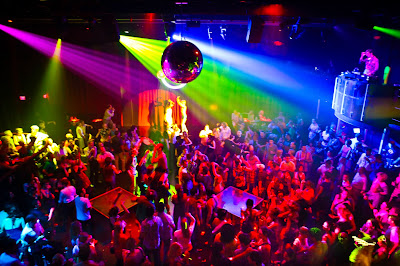Why Nightclubs Work
Bright lights, high noise levels and a general consensus that everyone's pissed all contribute to an environment where awkwardness is socially acceptable and widely practiced.
They're epilepsy inducing, ear-drum bursting, sweat reeking cesspools of dutch courage. So why are nightclubs so embedded into our popular culture? This remains a question which has racked my brain for many a year now and has brought me to maybe a rather unsophisticated conclusion - they are the only place where social awkwardness goes amiss without judgment or condemnation.
This might come across as strange to many people. What exactly do I mean by awkwardness? Well, where else can you stand around mouthing the lyrics of a song you don't really know whilst eyeing up every member of the opposite sex that passes? Where else can you commit sexual obscenities with someone whose name you don't even know, in public? Where else can you dance like a new-born gazelle with a physical handicap and no one will laugh at you or make underhanded remarks? The latter question can be answered tersely - because no one can hear you. But a better question is, how come these establishments facilitate such social ineptness?
Dj's have a hand to play in this. They ensure that there is a constant backdrop to everything you do, making the most vapid of individuals feel part of 'something bigger'. There is no doubt in my mind that this factor encourages people to make more brash decisions which, in another setting, would appear injudicious. The other impact a constant stream of music has, is it releases the pressure to talk. It's very easy to look and act 'cool' when you don't have to open your mouth. Furthermore, it means that if you happen to bump into someone that you know, a quick nod or some kind of dancing motion which acknowledges the person's existence suffices.
Next, comes possibly the most obvious of influences. Drugs, glorious drugs. Alcohol, of course, being the most prominent, but nightclubs host an array of other delicacies, just not at the counter of a bar. However, the black market of nightclubs is not the subject of this piece, but the effect of its products along with the ones served legally. While intoxication will predictably cause acts of foolishness and general blackguarding (which can also lead to animosity) its social effect reaches beyond the realms of its physical effect. Excusing acts of folly due to an alcoholic effect is very easy in the nightclub setting as you presume the majority of people are, to some extent, inebriated. This allows the few sober folk who wind up in clubs to pass off antisocial and awkward behaviour as being substance-influenced.
On a final note, the bright lights/dim lighting combination epitomises, for me, the environmental effect of nightclubs. The aforementioned 'something bigger' effect comes to play again as any plain vision of people's disposition is clouded by a flurry of grey, then green, then red, then strobes. How we react to this flurry of brightness and darkness (i.e. fist-bumping our little hearts out) further takes away from our social perception.
I realise that this analysis on the appeal of nightclubs falls short in many categories, but I do believe that the concept of having a place where your social awkwardness can roam free and be at one with everyone else's calamities is something powerful. It might even be something to be admired. Scratch that, you just look like a tit. But hey, so does everyone else.



Comments
Post a Comment